
My adult kids.
Did you work part-time when you were in high school? We all did when I was growing up. My brother bagged groceries at Safeway. I worked after school and summers in my dad’s dental office. My friends picked strawberries, worked for their family businesses or at fast food places. We all worked.
Now, in contrast, how many of your children’s friends have jobs — especially if they come from families who aren’t worried about money? In an article in the Pittsburgh Post Gazette, Tim Grant wrote about the fact kids aren’t working because of sports, SAT prep classes, homework and other activities and how it’s affecting kids entering adulthood.
From helicopters to bulldozers, wealthy parents clear their children’s path
Many of the high net worth clients that Pittsburgh wealth manager Matt Helfrich has worked with over the years can trace their strong work ethics back to summer jobs and after school work they did in high school and college.
Yet the opposite may be true for their own children.
Mr. Helfrich said that over the last decade of advising rich clients on their financial affairs, he has come to recognize a definite trend: their school-age children don’t work.
“More and more, we are seeing kids not doing high school jobs,” said Mr. Helfrich, president of Bridgeville-based Waldron Private Wealth, which manages $2.4 billion in assets for 220 clients.
Instead of punching a time clock in their free time, he said most — if not all — of his clients’ children are preoccupied with sports, test preparation, volunteer assignments or high school study abroad programs.
Not that those activities don’t have merit.
But they don’t provide young people with life lessons about the value of a dollar or skills that come with budgeting their own hard-earned money. Mr. Helfrich said he believes when children don’t take any responsibility for their own financial outcomes, it gives way to a phenomenon called the “bulldozer parent.”
“Bulldozer parents flatten all obstacles in their child’s way,” he said, explaining that bulldozer parents keep their wallets ready to foot the bill for major purchases like college, cars and housing so that their children need not worry.
By directing these bills away from their children, parents are robbing them of the opportunity to learn about budgeting, making financial choices and building their own credit.
“We’ve had adult children of our clients try to get a mortgage or even a credit card, and they can’t get one because they’ve never had credit in their name before,” Mr. Helfrich said.
I am proud to say my kids worked in school. My son tutored, he worked as a swim coach and he was paid to design and maintain a website. In middle school, he was an assistant lifeguard and would be sweeping the pool or washing down the deck. My daughter was swimming all the time and didn’t have time for work outside of coaching and swim clinics. But her swimming turned into a job that paid for her college education and she now has a career in the swim industry.
In college, my son worked retail, maybe more hours than he should have. My daughter worked as a lifeguard, swim coach and swim camp counselor. I never even thought it was odd that they would work while at school. After all, that’s what we all did back in the day. I would find it strange if they weren’t working.
“About once or twice a year I will meet with a family who has the issue of an adult child who has become ‘infantilized,’” he said. “And over two decades, that’s a lot.”
“This approach to parenting, at best, fosters learned helplessness,” he said. “Typically, it fosters entitlement. And at worse, the child becomes so dysfunctional that they depend on and drain everyone they know.
“They try to turn everybody into their parents and expect everyone to behave like that. That’s not life.”
In worst-case scenarios, Mr. Chaney said he has seen children grow up with parents doting on them, then when the parents died, the child’s life spiraled out of control to the point of draining their trust fund.
The college years, he said, can be a defining period. Children from wealthy families often don’t need to work and get a monthly stipend.
The article goes on to give good advice to parents on how to help them build credit, make financial decisions and learn budgeting. You can read the parent tips and more of the article here.
What is your experience with kids working in high school and college?











